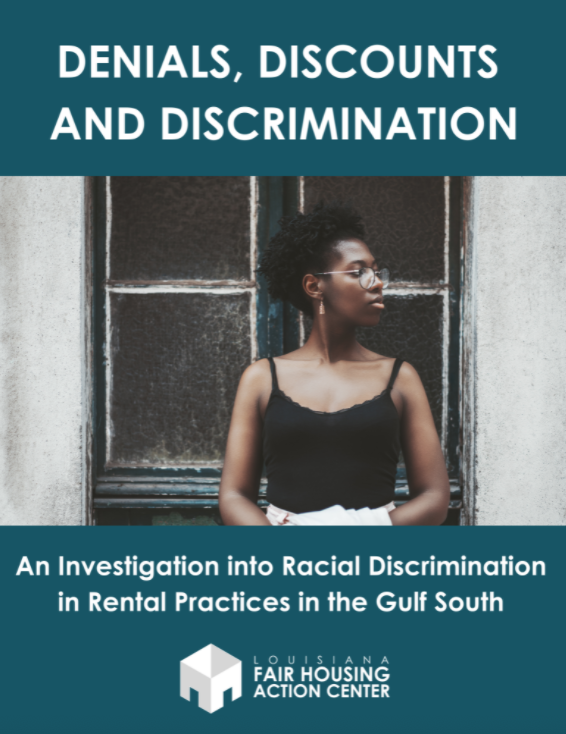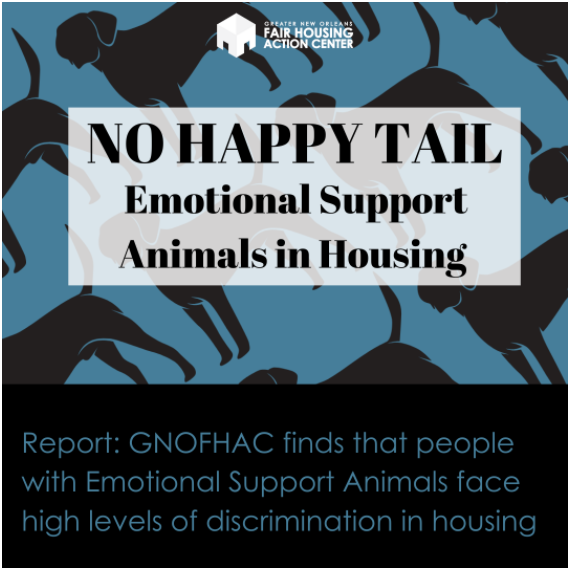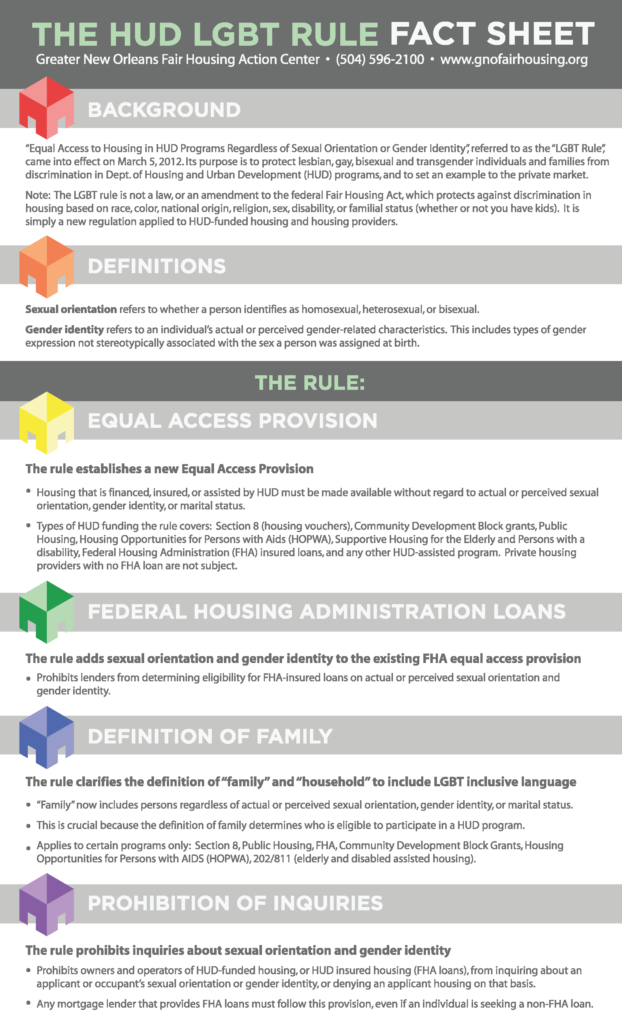Publications
The Mobility Myth: Housing Choice Voucher Discrimination in Orleans Parish
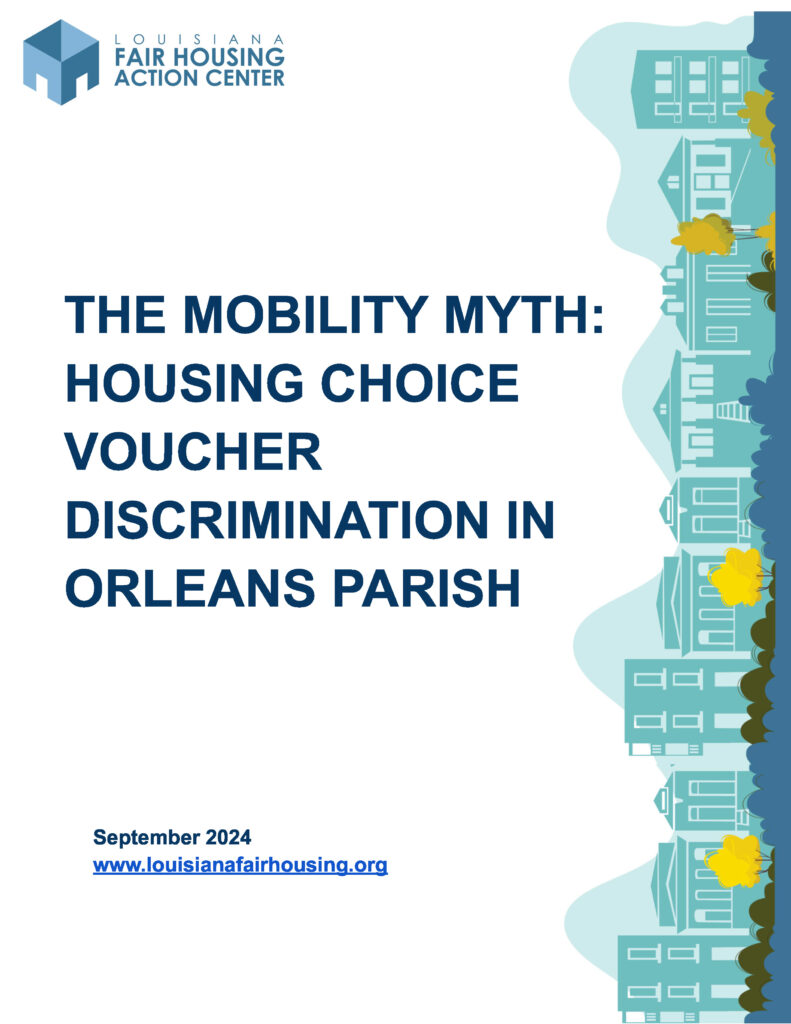
In the fall of 2023, the Louisiana Fair Housing Action Center investigated whether or not landlords in Orleans Parish would accept a housing choice voucher as payment for rent, including if housing providers would respond differently based on the race of prospective renter. We found that two out of three voucher recipients reported being denied housing as a result of their voucher. With almost 16,000 vouchers in use across New Orleans and Black families making up the majority of such voucher holders, these findings demonstrate the far-reaching impacts discrimination has on finding and securing housing in the neighborhood of one’s choosing. For the most vulnerable among us, equal access is not guaranteed.
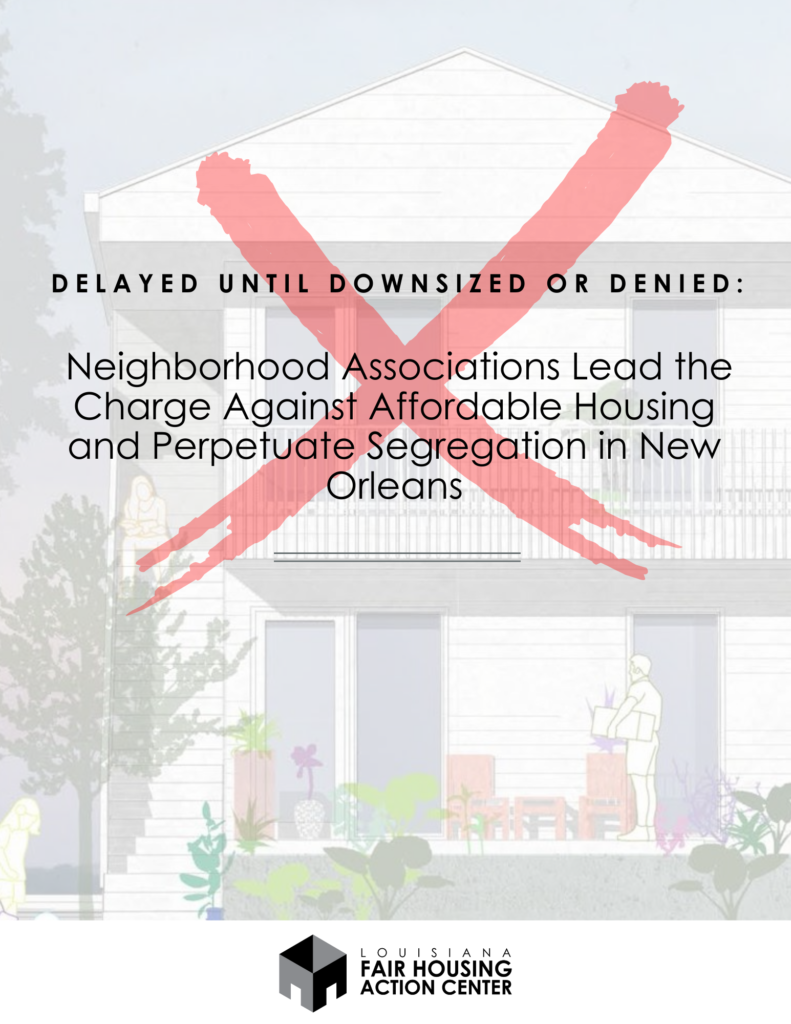
Delayed Until Downsized or Denied: Neighborhood Associations Lead the Charge Against Affordable Housing and Perpetuate Segregation in New Orleans
This report shows that local politicians and our existing land-use approval process grants neighborhood associations significant power over land-use decisions. That practice reinforces segregation when the groups consistently oppose affordable housing in gentrifying and high opportunity neighborhoods, or neighborhoods with better access to jobs, green space, high-performing schools, grocery stores, and other amenities. In fact, in the past 15 years, Not In My Back Yard (NIMBY) opponents of affordable housing have killed 422 apartments for working-class New Orleanians and delayed another 184 that might already be under construction or completed were it not for sustained
opposition.
Denials, Discounts and Discrimination: An Investigation into Racial Discrimination in Rental Practices in the Gulf South
This investigation into racial discrimination in rental housing in the Gulf South cities of New Orleans, LA; Houston, TX; Dallas, TX; and Jackson, MS involved 240 paired tests during which African American testers received differential treatment on 126 occasions, or 53% of the time. In each of the four cities, African American testers often faced multiple kinds of discrimination during a single housing transaction. The findings of this investigation reinforce the urgency with which we must continue to combat all forms of housing discrimination.
No Happy Tail: Emotional Support Animals in Housing
This investigation showed that only 1 in 5 landlords would accept an emotional support animal in accordance with fair housing laws. Over the past two years, LaFHAC has seen a significant increase in the number of fair housing complaints lodged concerning assistance or emotional support animals. The investigation revealed that the vast majority of landlords tested were either ignorant of their responsibilities under fair housing laws, or worse, skeptical of the testers’ disability and need for an animal.
New Orleans Substandard Rental Housing Crisis
Continues
New Orleans is a majority-renter city. Updated American Housing Survey (AHS) data released this
month reveals that thousands of families continue to live in substandard rental housing. Despite
slight improvements in housing quality, the 2015 AHS data reveals consistent housing trends since
the last time AHS data was released in 2011. As an example, the number of units with leaks from
the inside is down from 6,850 to 4,400, and units with leaks from the outside are down from 5,300
to 4,900. Still, housing quality is not keeping pace with recent dramatic increases in rent.
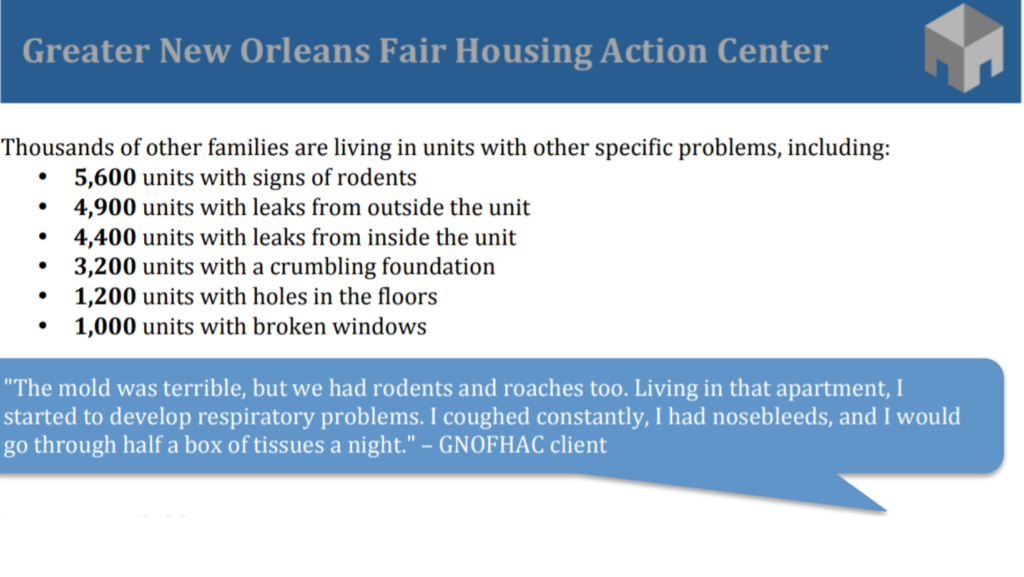
Practical Steps to End Poverty for Families in the Housing Choice Voucher Program
The largest affordable housing program in New Orleans serves one-quarter of all renters, but leaves them segregated in farther-flung, high-poverty neighborhoods. With assistance from HUD, the Housing Authority of New Orleans (HANO) has an invaluable opportunity to utilize new tools and provide real housing choice to voucher families.
Report: Criminal Background Policies Used as a Cover for Discrimination
LaFHAC (formerly the Greater New Orleans Fair Housing Action Center) released a new investigation revealing that New Orleans area housing providers treated prospective renters with criminal backgrounds differently based on the applicants’ race. The study, LOCKED OUT: Criminal Background Checks as a Tool for Discrimination, analyzes a testing investigation of 50 area housing providers, in which mystery shoppers posing as prospective renters inquired about rental availability and the apartment’s criminal background policy. Of the 50 site-visit tests conducted, African American testers experienced discrimination 50% of the time.
Of the 50 site-visit tests conducted, African American testers experienced discrimination 50% of the time.
From Report: Criminal Background Policies Used as a Cover for Discrimination
Report: African American Renters Face High Rate of Discrimination in New Orleans Upscale Neighborhoods
LaFHAC (formerly the Greater New Orleans Fair Housing Action Center) released a new report revealing troubling levels of housing discrimination against African Americans in New Orleans’ high opportunity neighborhoods. The study, Where Opportunity Knocks the Doors Are Locked, found that African American mystery shoppers posing as prospective renters were either denied the opportunity to rent or received less favorable treatment than white mystery shoppers 44% of the time in New Orleans neighborhoods that offer high opportunity levels to families.
For Rent: Unsafe, Overpriced Home for the Holidays
LaFHAC (formerly the Greater New Orleans Fair Housing Action Center), the Greater New Orleans Housing Alliance (GNOHA) and Southeast Louisiana Legal Services (SLLS) released a white paper that reveals the prevalence of unsafe and unhealthy conditions in the City’s rental homes, in spite of rapidly rising rents. The data is coupled with stories of frustration from New Orleans renters, which indicate that there is no functional system to process complaints from tenants or inspect rental properties for basic standards of quality and safety.Unsafe home for the holidays.
When they move, renters run the risk of being unable to find safe, decent housing they can afford. If they stay, they risk their health and the health of their families.
From For Rent: Unsafe, Overpriced Home for the Holidays
People’s Analysis of Impediments (AI) to Fair Housing
Created by a working group led by LaFHAC (formerly the Greater New Orleans Fair Housing Action Center) and the Lawyers’ Committee for Civil Rights Under Law, the “People’s AI” is an assessed on New Orleans’ 2010 Analysis of Impediments, and recommendations for action the City of New Orleans should consider adopting in order to expand fair housing.
GNOFHAC Commentary Published in the ABA’s Journal For Affordable Housing And Community Development
Assistant Director Kate Scott and Development and Communications Coordinator Marlene Theberge discuss GNOFHAC’s work in Volume 22-2 of the American Bar Association’s Journal of Affordable Housing & Community Development Law.
The HUD LGBT Rule
In March, 2012, the U.S. Department of Housing and Urban Development (HUD) published a new rule that prohibits discrimination on the basis of sexual orientation, gender identity or marital status in HUD housing programs.
Strategies To Affirmatively Further Fair Housing: Proposals for the City of New Orleans
On April 27, 2011, the Greater New Orleans Fair Housing Action Center (GNOFHAC) and national partner the Lawyers’ Committee for Civil Rights Under Law (LCCRUL) released a handbook entitled “Strategies to Affirmatively Further Fair Housing: Proposals for the City of New Orleans Comprehensive Zoning Ordinance and Beyond” to address impediments to fair housing in New Orleans. Copies of the handbook have been distributed to members and staff of the City Planning Commission (CPC). GNOFHAC hopes that Commission members will adopt the suggestions laid out in the handbook in the development of the new Comprehensive Zoning Ordinance in order to ensure a more just, economically integrated, and livable New Orleans.
Housing Choice In Crisis: Discrimination Against Housing Choice Voucher Holders
Housing Choice in Crisis examined one hundred (100) rental properties in the greater New Orleans area to determine whether available rental units would be offered to voucher holders relying on the HCVP. Rental properties investigated advertised rental rates of $1250 or under for a two-bedroom unit and did not advertise any preference in favor of or against renting to voucher holders. In addition to the audit of rental units for source of income discrimination, Housing Choice in Crisis includes results from a series of interviews with landlords, housing advocates, tenants and administrators to assess the administration of HCVP.
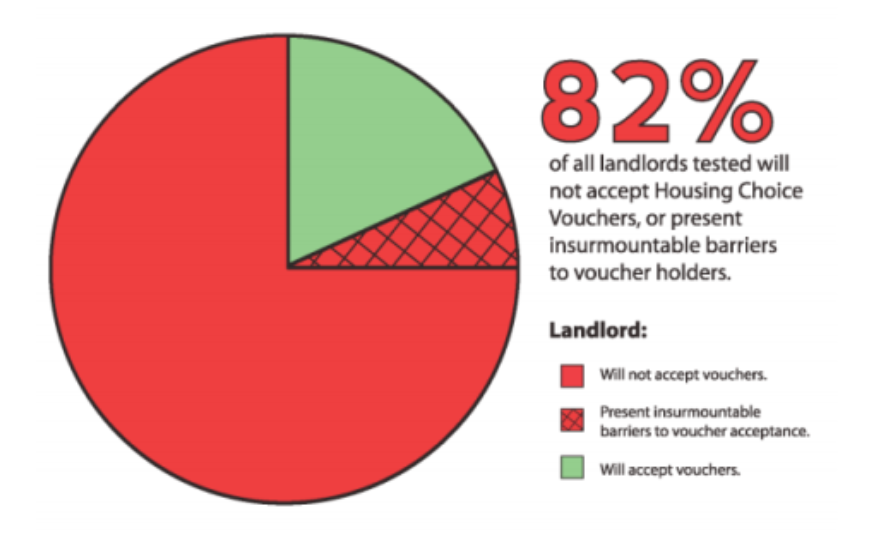
Access Denied: Housing Accessibility for People with Physical Disabilities in the Greater New Orleans Rental Housing Market
Despite the passage of the Fair Housing Act in 1968 and the Fair Housing Amendments Act of 1988, the Greater New Orleans Fair Housing Action Center’s (GNOFHAC) Access Denied 2009 audit report demonstrates that as of April 15, 2009, the greater New Orleans area has not achieved equal housing opportunity for people with physical disabilities. Access Denied documents, describes, and quantifies accessibility barriers which amount to discrimination against people with disabilities in rental housing.
For Rent Unless You’re Black: Race Discrimination in the NOLA Housing Market
Despite the passage of the Fair Housing Act in 1968 and the Fair Housing Amendments Act of 1988, the passage of the Louisiana Open Housing Law and the City of New Orleans’ Human Rights Laws, the Greater New Orleans Fair Housing Action Center’s (GNOFHAC) 2007 Fair Housing Rental Study indicates that as of April 24, 2007, the New Orleans metropolitan area has not achieved equal housing opportunity. The Rental Audit documents, describes and quantifies the rate of discrimination against African American testers in rental housing throughout the New Orleans metropolitan area. The Rental Audit not only measures the extent of the discrimination, but also reveals the nature of that discrimination – how housing providers are discriminating in rental housing.

